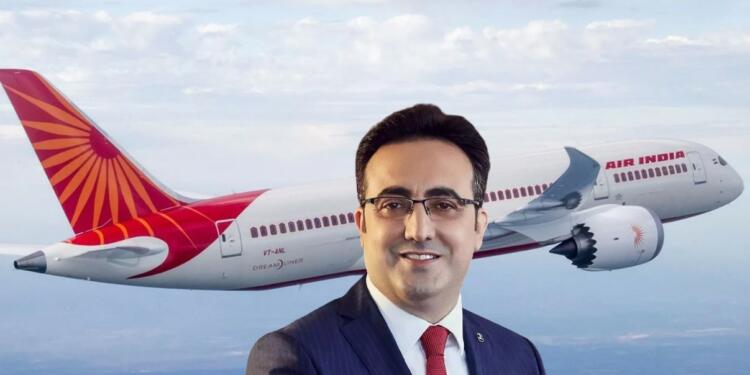India witnessed a watershed moment when a money-guzzling, debt-ridden PSU mired with bureaucratic lethargy was privatized. The move marked the beginning of what could be a revolution for Indian aviation. And what came as even more positive news, Tata Sons won the bid for purchasing the national carrier – Air India.
It was believed by many that if there is one corporate group that can turn around the fortunes of Air India, it is the Tata Sons. And thus, the decision came as a relief for many. However, its decision to induct Ilker Ayci as MD and CEO has led many to raise their eyebrows.
Ilker Ayci – the Managing Director and CEO of Air India
Earlier this week, the Tata Group announced that it has appointed Ilker Ayci — former Turkish Airlines Chairman — as Air India’s Managing Director and CEO effective on or before April 1. With his appointment as MD and CEO, Tata Group claims to have appointed an “expatriate chief” to run the airline.
Tata Group Chairman N Chandrasekaran, in a statement, reported, “Ilker is an aviation industry leader who led Turkish Airlines to its current success during his tenure there. We are delighted to welcome Ilker to the Tata Group where he would lead Air India into the new era.”
A look at the life of Ilker Ayci
Born in Istanbul in 1971, Ayci reportedly is 1994 alumni of Bilkent University’s Department of Political Science and Public Administration. After a research stay in political science at the Leeds University in the UK in 1995, he completed an International Relations Master’s programme at the Marmara University in Istanbul in 1997.
Read more: Tata to purchase Air India: The start of a revolution in Indian aviation
He worked with organisations such as Kurtsan Ilaclari A.S., and Istanbul Metropolitan Municipality, among others. Between 2005 and 2006, he also worked as a general manager for Basak Sigorta A.S., and then for Gunes Sigorta A.S. between 2006 and 2011.
In 2011, he headed the Republic of Turkey Investment Support and Promotion Agency. Further, he was elected vice president of the World Association of Investment Promotion Agencies in 2013, and then its chairman in January 2014.
Ilker Ayci was chairman of Turkish Airlines since 2015. Prior, he worked on the company’s board. His resignation came from the post on January 27 this year. notably, it was the same day when Air India was handed over to the Tatas.
What Air India actually needs?
If you go through the professional journey of Ayci, you’ll realize that he does not have the experience that Air India currently needs.
Air India is India’s major airliner which connects almost all parts of the world to our country. It has a vast fleet of jets. As of August 2021, Air India operates no less than 127 aircraft, which include fleets of Boeing 777-300ER, Boeing 777-200LR, Boeing 747-400 and Airbus A320neo among others. Air India has a vast network whose potential, sadly, remains untapped.
Read more: The future of Indian Aviation will be dominated by Indigo, Tata and Rakesh Jhunjhunwala’s Akasa Air
A fundamental problem that plagued Air India for decades was its non-profit oriented business approach. Being a “national carrier”, which received bailouts from the Indian government time and again, Air India never really took things seriously, which is why its debt situation only turned from bad to worse.
With Air India’s privatization, India is expecting a revolution in the aviation sector. And thus, it was required to appoint aviation experts like Murari Lal Jalan, Rono Dutta and Ajay Singh who are well versed with the industry.
For those unversed, it was Murari Lal Jalan whose efforts led to a surge of nearly 5% Shares of grounded airline Jet Airways. Murari Lal Jalan of the Jalan-Kalrock consortium had then stated that “They expect to restart operations of the defunct airline in four to six months after receiving approval from the NCLT for its resolution plan.”
After opening in the green, the airline’s share rose 4.98% to hit the upper circuit limit of ₹114.90 on the BSE.
After Jalan, we have Ajay Singh on the list. Reportedly, by December of 2014, SpiceJet Ltd, then controlled by media baron Kalanithi Maran’s Sun Group, was debt-ridden and on the verge of closure. It was soon to enter the path of bankruptcy. And then, Ajay Singh happened who was also the co-founder of SpiceJet in 2005. The man saved the airlines from dying.
These were the aviation experts that Air India needed at the current time. But, in contrast to what was required, Air India appointed Ayci as the new CEO who merely has worked for around 6-7 years in the aviation sector. That too, for the Turkish airlines which unlike India is not too big and complex.
Thus emerges many questions on our minds. Will Ilker Ayci be able to deal with such a big responsibility? Will Ilker Ayci be able to lead India to witness a revolution in the aviation industry?
Whatever the consequences of the decision will be, it will be an interesting show to watch.




























